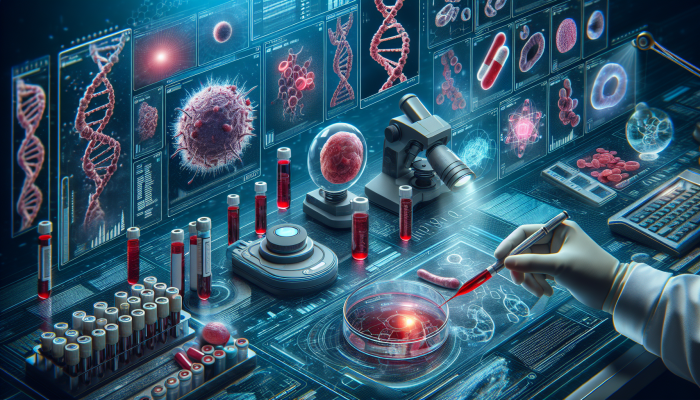Transforming Cancer Detection Through Cutting-Edge Blood Tests and Revolutionary Technologies
The landscape of cancer detection is experiencing a profound transformation, significantly driven by advancements in blood tests for assessing cancer risk. These pioneering tests represent a substantial advancement in identifying potential cancer biomarkers within the human body. Such innovations enable earlier interventions, which can dramatically improve patient outcomes and survival rates. To successfully navigate the complex and often intimidating terrain of cancer diagnostics, it is crucial to develop a comprehensive understanding of the fundamental principles behind these tests, as well as the latest groundbreaking innovations reshaping this vital segment of healthcare.
Diving Deep into the Science of Blood Tests for Cancer Risk: A Comprehensive Examination

At the core of blood tests for cancer risk lies the essential identification of specific biological indicators referred to as biomarkers. These biomarkers serve as crucial signals that suggest the presence of potential cancerous changes or an increased likelihood of developing cancer in the future. They encompass a diverse array of substances, including proteins, genes, and various other materials produced either by malignant cells or by the body’s immune system in response to cancer presence. The scientific basis of these transformative tests relies on advanced methodologies that effectively identify these markers through a variety of cutting-edge technologies.
A primary method utilized in evaluating cancer risk is the liquid biopsy. This innovative technique involves analyzing a blood sample to detect components such as circulating tumor DNA (ctDNA) and circulating tumor cells (CTCs). The non-invasive nature of this technique allows for a thorough assessment of a patient's cancer risk without the need for more invasive procedures like traditional tissue biopsies. Furthermore, advancements in technology, especially in the realm of next-generation sequencing (NGS), have significantly enhanced the sensitivity and specificity of these tests, enabling the detection of even the most minuscule traces of ctDNA.
The accuracy of blood tests for cancer risk is intimately connected to our understanding of cancer biology. Different types of cancer release distinct biomarkers into the bloodstream, fueling ongoing research aimed at discovering new markers that could act as early warning signs. For example, the levels of prostate-specific antigen (PSA) are routinely monitored to assess prostate cancer risk, while the CA-125 marker is frequently associated with the detection of ovarian cancer.
Moreover, the integration of artificial intelligence (AI) into the analysis of test outcomes is significantly reshaping this domain. AI algorithms possess the capability to analyze vast datasets, revealing patterns that may be overlooked by human analysis, thereby greatly improving the predictive accuracy of these tests.
Unveiling the Latest Breakthroughs in Blood Tests for Cancer Risk: Significant Advancements
The field of blood tests for cancer risk is currently witnessing extraordinary innovations that possess the potential to redefine cancer screening and prevention methodologies. A particularly notable advancement is the development of multi-cancer early detection (MCED) tests. These groundbreaking tests are designed to identify various types of cancer from a single blood sample, significantly minimizing the need for invasive procedures and enhancing overall patient comfort and experience.
Recent studies have demonstrated that MCED tests can effectively identify cancers at their most nascent stages, often prior to the appearance of any clinical symptoms. This early detection is of paramount importance, as it is directly associated with improved treatment outcomes and higher survival rates. For instance, research published in a prominent oncology journal highlighted the remarkable capability of an MCED test to uncover malignancies that are typically difficult to diagnose early, such as pancreatic cancer and ovarian cancer.
Another significant development in this area involves the exploration of methylation patterns found in circulating DNA as a diagnostic tool. Variations in methylation often indicate cancerous processes, prompting researchers to investigate how these patterns might be utilized for more precise cancer risk assessment. This innovative technique could provide a highly sensitive method for detecting cancers that currently lack effective screening protocols, thereby enhancing patient care.
Furthermore, partnerships between technology firms and healthcare providers are driving the development of groundbreaking diagnostic tools. These collaborations aim to leverage big data and machine learning to enhance blood sample analysis, resulting in more accurate risk assessments and personalized management strategies for patients.
Understanding the Revolutionary Role of Liquid Biopsies in Cancer Detection and Treatment Strategies
Liquid biopsies represent a significant advancement in the realm of blood tests for cancer risk. Unlike traditional biopsies that require invasive tissue samples, liquid biopsies offer a minimally invasive alternative that can be performed multiple times, facilitating continuous monitoring of cancer progression or responses to treatment. This flexibility is particularly advantageous for patients who may not be suitable candidates for surgical biopsies due to various health concerns.
Liquid biopsies function by isolating and examining ctDNA or CTCs extracted from a blood sample. The ability to monitor these cellular components provides valuable insights into tumor behavior and potential genetic alterations that may occur throughout the disease's progression. For example, identifying specific mutations can help oncologists select targeted therapies, thereby personalizing treatment plans for greater effectiveness and success rates.
The adoption of liquid biopsies in clinical practice is already yielding promising outcomes. Recent clinical trials have shown that these tests can detect recurrences in patients who have previously undergone cancer treatments, often several months before traditional imaging techniques can do so. This timely identification can enable prompt interventions, ultimately improving survival rates and enhancing overall patient health.
Additionally, liquid biopsies enable real-time monitoring of treatment responses. By measuring ctDNA levels during therapy, healthcare providers can assess the efficacy of the treatment plan and make necessary adjustments to optimize patient outcomes. This proactive monitoring approach signifies a major shift toward a more dynamic management of cancer care, ensuring that patients receive the most effective treatment tailored to their unique circumstances.
In summary, blood tests for cancer risk, particularly through the implementation of liquid biopsies, are revolutionizing the field of oncology. Their potential for early detection, continuous monitoring of disease progression, and personalized treatment approaches positions them as invaluable resources in the ongoing fight against cancer. As research and technological advancements continue to evolve, the outlook for these tests to improve patient outcomes and transform cancer care remains exceptionally promising and optimistic.
Engage with Us: Join Our Facebook Community for the Latest Updates!

This Article Was First Published On https://bloodtest.co.uk
The Article: Blood Tests for Cancer Risk: Pioneering Early Detection Methods appeared first on: https://ezbloodtest.com
The Article Cancer Risk Blood Tests: Innovative Methods for Early Detection Was Found On https://limitsofstrategy.com


Your exploration of the advancements in blood tests for cancer detection is both timely and relevant, considering the increasing prevalence of cancer and the urgent need for early intervention strategies. The promise that these tests can identify specific biomarkers not only represents a leap in diagnostic capabilities but also opens up a broader discussion about the intersection of technology and personalized medicine.
You’ve touched on an incredibly important aspect of modern medicine that goes beyond just the science of diagnosis. The rise of blood tests for cancer detection indeed points to an exciting shift in how we approach healthcare. What’s fascinating is not just the development of these tests themselves but also the broader implications of what they mean for patients and the healthcare system as a whole.
You’ve hit on something really significant here. The shift towards using blood tests for cancer detection certainly revolutionizes how we think about diagnosis and early intervention. It’s interesting to me how these tests not only promise a less invasive way of identifying potential issues but also the psychological impact they have on patients. There’s something quite powerful about the idea of being able to monitor our health with a simple blood draw rather than more invasive procedures, which can often involve a lot of anxiety and uncertainty.
It’s interesting to see how premium private blood tests in Winchester are not just advancing cancer detection, but also reshaping the way we think about patient care and the healthcare landscape overall.
‘Private Blood Tests in Winchester: Premium Services Available’
https://berwickambassadors.co.uk/private-blood-tests-in-winchester-premium-services-available/.
You’re so right about the impact of blood tests for cancer detection. It really does feel like a game changer, shifting the focus from invasive procedures to something much simpler and less stressful for patients. There’s a certain reassurance that comes with the idea of just needing a blood draw. It’s less about anxiety and more about empowerment—giving people the chance to take the reins on their own health journeys.
“Curious about how these innovative blood tests can benefit you? Discover more about the premium services available in Winchester to take control of your health.”
https://berwickambassadors.co.uk/trustindex
You bring up some really important points about the shift towards using blood tests for cancer detection, and it’s fascinating how this change not only alters the practical aspects of diagnosis but also touches on the emotional and psychological experiences of patients. It’s true that traditional cancer screening methods, while crucial, often come with their own set of anxieties—think of biopsies or scans that can involve waiting and worrying, sometimes for days or weeks.
You raise such a thoughtful point about the emotional weight that traditional cancer screening methods can carry. The waiting period after a biopsy or scan can feel like an eternity, filled with uncertainty and worry, and it can take a toll not just on patients but also on their families.
“I’m glad you found the insights valuable! If you’re interested in exploring more about this evolving landscape of cancer detection and the emotional implications, check out this resource that delves into the latest advancements.”
https://berwickambassadors.co.uk/eComToolkit
You’ve highlighted a crucial aspect of this shift towards blood tests for cancer detection that often goes overlooked—the emotional and psychological weight that accompanies traditional screening methods. It’s easy to focus solely on the clinical benefits or drawbacks of a new technology, but the human experience is at the core of any medical advancement.
You’ve highlighted a crucial aspect of this shift towards blood tests for cancer detection that often goes overlooked—the emotional and psychological weight that accompanies traditional screening methods. It’s interesting to think about how much our relationship with medical technology has evolved over time. Traditional imaging techniques, like mammograms or colonoscopies, often come with a considerable amount of anxiety not just because of the procedures themselves but also due to the waiting periods for results. That anticipation can weigh heavily on someone already facing the potential stress of a cancer diagnosis.
You’ve brought up a significant point regarding the emotional toll of traditional screening methods. The anxiety tied to waiting for results can feel overwhelming, especially when a potential cancer diagnosis is hanging in the balance. This uncertainty adds a layer of mental strain that isn’t often discussed, but it plays a huge role in how patients experience the entire process.
“To explore how innovative advancements in blood tests can help alleviate some of this emotional burden, check out our latest insights here.”
https://berwickambassadors.co.uk/emailoctopus
You’ve highlighted a crucial aspect of this shift towards blood tests for cancer detection that often goes overlooked—the emotional and psychological weight that accompanies traditional screening methods. It really does speak to the broader conversation around how we approach health and wellness.
You’ve really hit on a profound point about the emotional and psychological weight that traditional screening methods carry. It’s fascinating how a simple blood test can shift not just the logistics of detection, but also the way people psychologically engage with their health.
I recently came across a helpful guide on liver blood tests that sheds light on how these insights can ease the emotional burden often tied to traditional screening methods.
‘Liver Blood Test Guide for Quick Insights in Dundee’
https://berwickambassadors.co.uk/liver-blood-test-guide-for-quick-insights-in-dundee/.
You’ve touched on a crucial point about the evolution of healthcare as we explore blood tests for cancer detection. It’s fascinating how this shift not only aims to improve medical outcomes but also fundamentally changes the patient’s journey. The less invasive nature of these tests does create a sense of empowerment—being able to monitor one’s health with a simple blood draw can alleviate a lot of the fear that comes with facing potential diagnoses.
It’s great to see your enthusiasm for the advancements in blood tests for cancer detection. The ability to identify specific biomarkers really is a game changer in how we think about cancer diagnosis and treatment. It’s not just about tech for tech’s sake, but how we can tailor interventions to individual needs based on what these tests reveal.
Thank you for your thoughtful comment! If you’re interested in learning more about the latest innovations in cancer detection and how they’re shaping the future of personalized medicine, check out this insightful resource.
https://berwickambassadors.co.uk/FaceTune
You make an excellent point about the intersection of technology and personalized medicine. The advancements in blood tests for cancer detection indeed feel like a turning point, especially in a landscape where early detection can significantly alter treatment outcomes. It’s fascinating how these tests can pinpoint specific biomarkers, transforming the way we think about diagnosis and treatment.
You’ve raised an important issue about the role of technology in advancing personalized medicine, particularly with cancer detection. It’s hard not to feel a sense of optimism when thinking about how these blood tests are changing the landscape. Being able to detect cancer earlier and more accurately can truly be a game changer for many patients.
I appreciate your thoughts on this! The way these blood tests target specific biomarkers really does change the game. It gets me thinking about how personalized medicine isn’t just about treatment plans anymore, but also about empowerment. Patients can become more informed participants in their care journey.
I’m glad you found that point resonant! If you’re interested in exploring more about these groundbreaking developments in cancer detection and personalized medicine, check out this detailed resource for further insights.
https://berwickambassadors.co.uk/krystal
You’ve touched on such an interesting aspect of this conversation. The precision of these blood tests is changing everything for patients and doctors alike. By identifying specific biomarkers, we’re looking at a future where treatments can be tailored to individual needs rather than adopting a one-size-fits-all approach. It opens up exciting pathways not only for cancer, but also for other diseases where early detection can be crucial.
You’ve raised some compelling points. The potential of these blood tests really is transformative, and it’s fascinating to think about how personalized medicine can reshape patient care. By pinpointing specific biomarkers, we’re moving towards a model where treatment plans are individualized, which could lead not just to better outcomes but also to a reduction in the side effects that come with more generic treatments.
You make some great points about the potential of these blood tests and their role in personalized medicine. It really does feel like we’re on the brink of a new era in healthcare where decisions can be more data-driven and tailored to the individual. It’s exciting to imagine how a deeper understanding of specific biomarkers could lead to not just improved efficacy in treatments but also a more compassionate approach to patient care.
I completely agree; the advancements in blood testing are indeed remarkable, and I recently came across a guide that delves into local liver blood test services that could be really beneficial for anyone looking to explore these personalized health options further.
‘Liver Blood Test Guide: Find Local Services in Hereford’
https://berwickambassadors.co.uk/liver-blood-test-guide-find-local-services-in-hereford/.
It’s great to hear that you’re excited about the advancements in blood tests and personalized medicine. The idea of tailoring healthcare decisions based on individual data really changes the game for both patients and providers. It’s refreshing to see how science is moving toward a more personalized approach, and the potential for improving treatment outcomes is something we should all pay attention to.
I’m glad you found the discussion compelling! If you’re interested in exploring localized options, this liver blood test guide could be a great resource for finding services in Hereford that align with this exciting shift towards personalized health. Check it out!
https://berwickambassadors.co.uk/trustindex
You touch on a really exciting point about the shift toward personalized medicine. With blood tests opening new doors to understanding individual health profiles, we’re starting to see how tailored treatments can enhance care and outcomes. It’s not just about numbers; it’s about building a deeper relationship between patients and healthcare providers based on specific needs.
I’m glad you found the discussion valuable! If you’re interested in exploring personalized health options further, check out this informative guide on local liver blood test services in Hereford. It could be a great resource for anyone looking to take control of their health!
https://berwickambassadors.co.uk/emailoctopus
You’ve touched on a big change in how we approach health care. The way these blood tests can pick up on specific biomarkers is a game changer for both patients and doctors. It opens up a whole new world for personalized treatment plans.
“Absolutely, the potential here is immense! If you’re interested in exploring more about these groundbreaking technologies, check out this insightful resource.”
https://berwickambassadors.co.uk/PhotoLeap
It’s great to see your enthusiasm for this topic. The way technology is evolving, especially in the realm of personalized medicine, is truly exciting. You’re spot on about how advancements in blood tests for cancer detection could redefine our approach to healthcare. These tests aren’t just a step forward; they represent a significant shift in how we understand disease at a deeper level.
“I’m glad you found the discussion on personalized medicine and cancer detection engaging! If you’re interested in exploring the latest advancements in this field, I invite you to check out this insightful resource.”
https://berwickambassadors.co.uk/ParentAler
You raise some vital points about the advancements in blood tests for cancer detection and their implications. The intersection of technology and personalized medicine is indeed fascinating. It’s encouraging to see how innovations in biomarker identification can reshape our approach to cancer diagnostics. It feels like we’re on the cusp of something genuinely transformative, doesn’t it?